Key takeaways:
- Pro-life advocacy emphasizes the sanctity of life, focusing not only on opposing abortion but also on creating a supportive culture for women facing unplanned pregnancies.
- Lobbying efforts are crucial for shaping policies that reflect pro-life values, with personal stories and data enhancing the impact on lawmakers.
- Challenges in lobbying include opposition from well-funded groups and the necessity of clear messaging amidst political rhetoric.
- The future of pro-life advocacy is leaning towards technology, grassroots movements, and collaboration with other movements to enhance effectiveness.
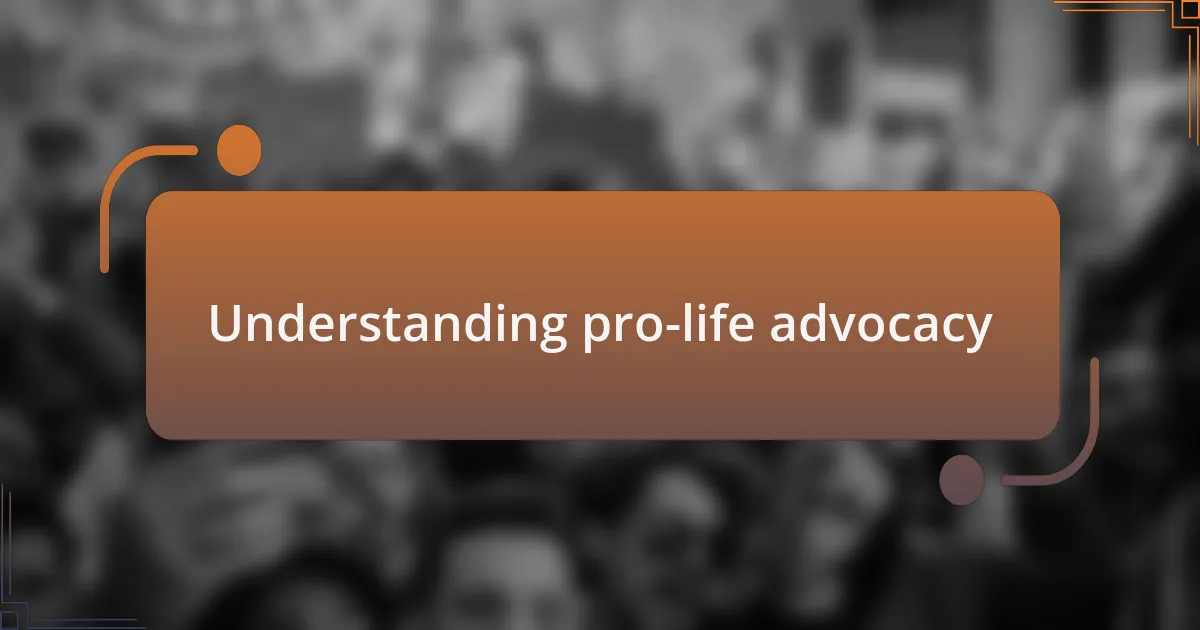
Understanding pro-life advocacy
Pro-life advocacy centers around the belief in the sanctity of life, asserting that human life begins at conception and should be protected. I remember sitting in a room filled with passionate advocates, all driven by their stories of hope and loss. It struck me how personal each journey was, reminding us that behind the policies and arguments, there are real lives affected.
When I think about the heart of pro-life advocacy, I realize it’s not just about opposing abortion; it’s about nurturing a culture that values life at every stage. Have you ever considered how this perspective shapes our communities? By fostering support systems for women facing unplanned pregnancies, we’re not just providing alternatives; we’re creating a safety net of compassion and understanding.
Emotional stories often underscore the mission of pro-life advocacy, revealing the profound impact of choices and consequences. I vividly recall hearing a mother share her experience of choosing life against all odds; her resilience was uplifting. It makes me ponder: how can we further amplify these narratives to change hearts and minds? Understanding the intricacies of this movement involves embracing both its ideological foundations and the deeply human stories that it seeks to protect.
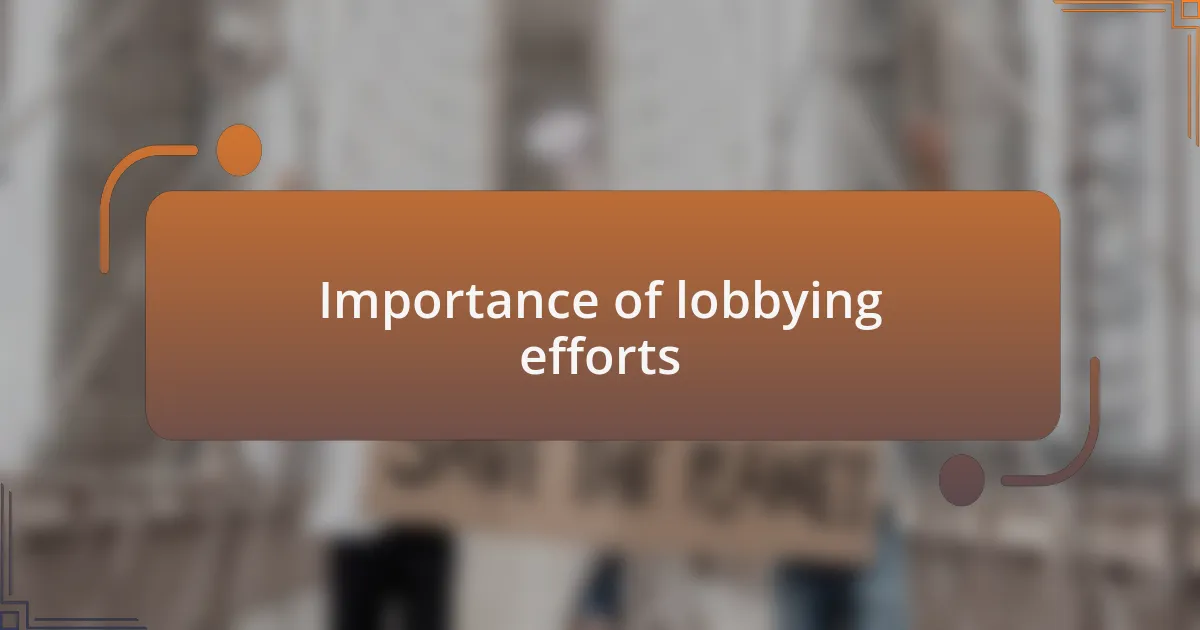
Importance of lobbying efforts
Lobbying efforts play a crucial role in shaping policies that align with pro-life values. I recall attending a legislative session where advocates rallied behind a bill aimed at increasing funding for pregnancy resource centers. The energy in the room was palpable as we shared our testimonies; it made me realize how vital our collective voice is in influencing decision-makers.
When advocating for life, the importance of a well-coordinated lobbying effort can’t be overstated. It was during a meeting with lawmakers that I saw firsthand how data and personal stories intertwine to make a compelling case. Listening to an elected official express their change of heart after hearing emotional accounts made me reflect: how many lives might we touch through persistent dialogue and engagement?
In this political climate, having a strong lobbying presence ensures that pro-life perspectives are represented. I often find myself pondering the question: what would happen if we didn’t actively participate in these conversations? It’s a reminder that our voices matter. If we want to see meaningful change, we must engage consistently in the legislative process, advocating passionately for policies that protect the most vulnerable among us.
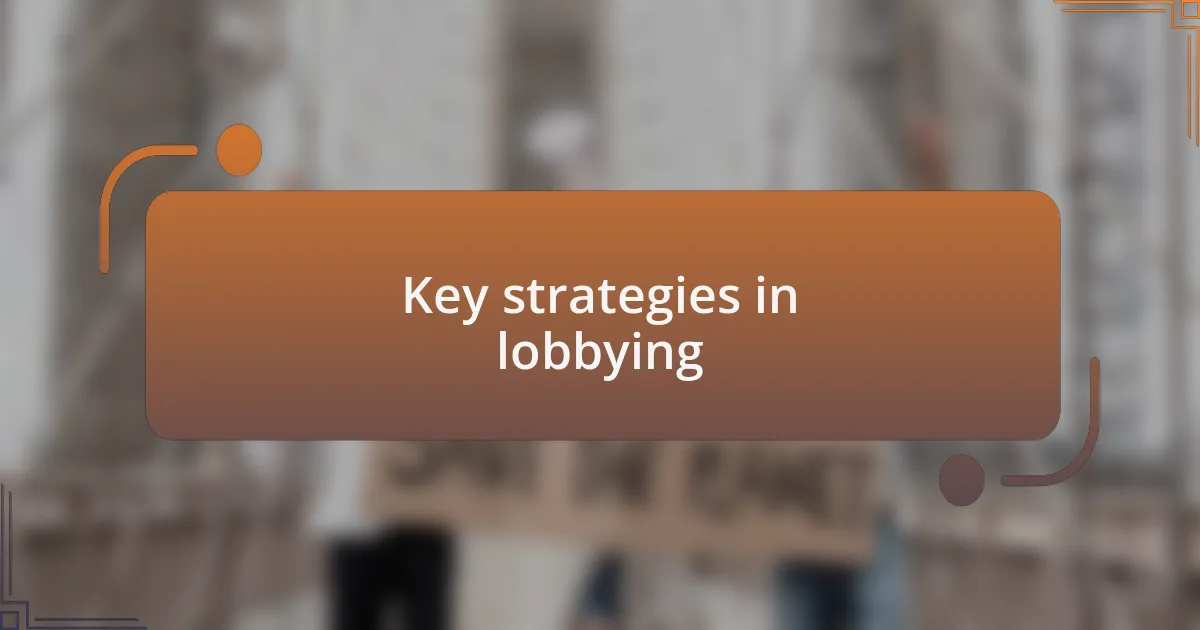
Key strategies in lobbying
One effective strategy in lobbying is building relationships with lawmakers. I remember a time when I reached out to my local representative, sharing my story and detailing how pro-life legislation would impact our community. Maintaining that connection not only helped me convey my message but also encouraged open communication, making it easier to advocate for our cause in the future.
Data and statistics are pivotal in lobbying, as they add credibility to our arguments. I once attended a conference where a speaker presented compelling figures on the benefits of supporting family planning resources. Seeing the lawmakers nod in agreement highlighted for me how essential it is to back our emotional appeals with solid evidence, which resonates powerfully in legislative discussions.
Engaging the grassroots is another key strategy; this means empowering ordinary citizens to voice their opinions. I vividly recall organizing a letter-writing campaign where local supporters shared their pro-life views with officials. The response was astounding—many representatives noted the influx of letters, which reminded me how collective action amplifies our message and can sway political tides. Isn’t it inspiring to think about the impact we can make when we unite for a common purpose?
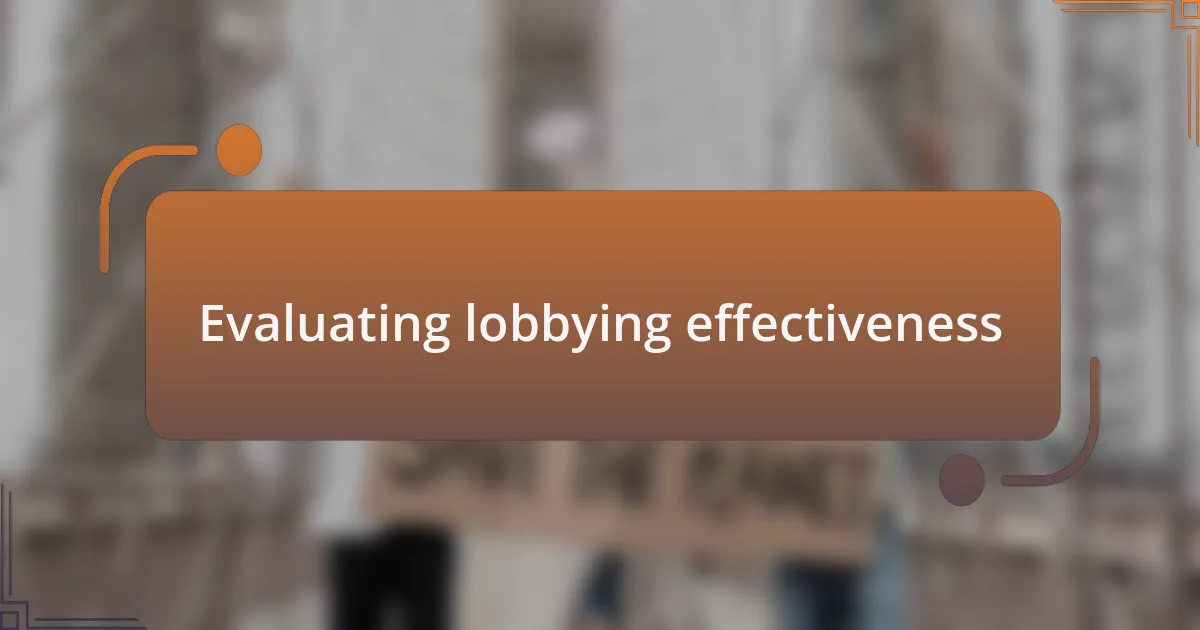
Evaluating lobbying effectiveness
Evaluating the effectiveness of lobbying efforts requires a keen understanding of the results of the strategies employed. I find it particularly enlightening to analyze whether our messages result in tangible changes in policy or legislation. For instance, after a series of meetings with legislators, I closely monitored any proposed bills related to pro-life initiatives. Tracking these developments helps me discern which approaches resonated—did the personal stories connect? Did the facts persuade?
It’s also crucial to gather feedback from lawmakers themselves. I once had a candid conversation with a senator who mentioned that hearing constituents’ stories impacted their views on certain issues. It made me realize that our lobbying effectiveness isn’t just about what we present; it’s also about how our narratives resonate with those in power. Are we genuinely reaching their hearts and minds?
Lastly, I believe in measuring the responses from the community. When I see people energized and ready to advocate, I know we’re making progress. One time, after a lobbying day in my state capitol, I gathered feedback from fellow advocates who shared their experiences. Their enthusiasm was contagious, confirming that effective lobbying isn’t just about legislation—it’s about building a movement that inspires change. How do we gauge that spirit in our ongoing efforts?
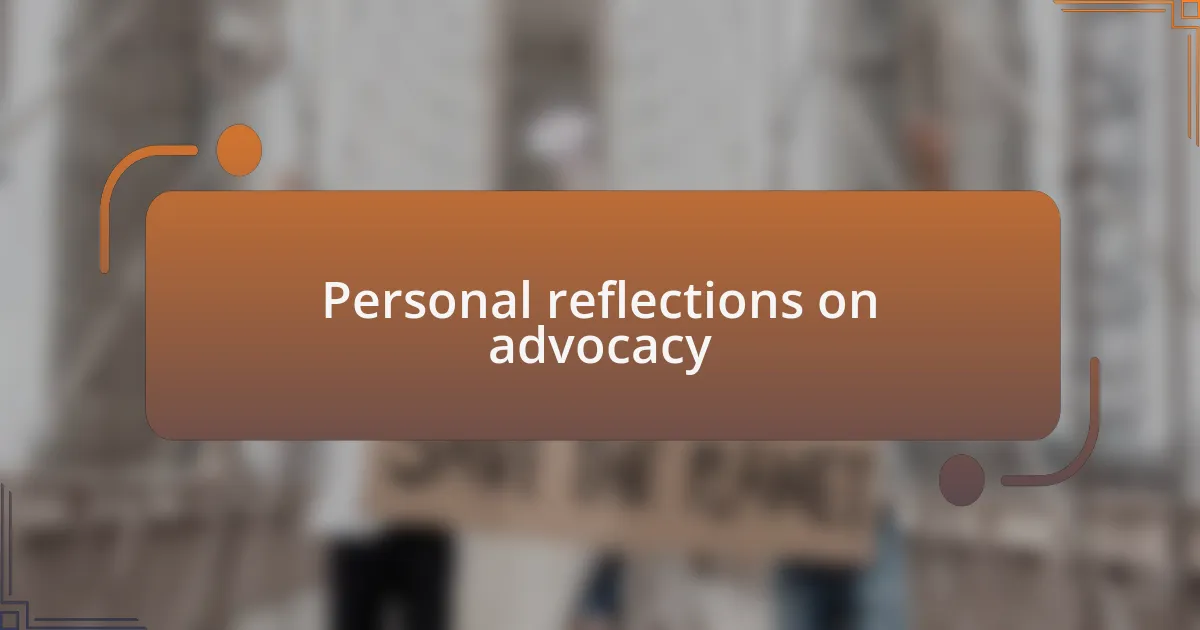
Personal reflections on advocacy
Personal advocacy is a deeply personal journey for me. There was a time when I attended a local pro-life rally, and I was struck by the sheer passion and commitment of everyone gathered there. Their energy reminded me that advocacy isn’t merely about statistics; it’s about the people behind those numbers—each one with a powerful story to share. How many lives can we touch by simply being present?
I often reflect on my own moments of doubt during advocacy efforts. One occasion stands out: I was unsure whether my voice would make a difference in a large group. Yet, when I shared my story, a young woman approached me afterward, expressing how my words had inspired her to get involved. That encounter reinforced my belief that every single voice matters—our words connect us and lead others to take action. Can we afford to stay silent when speaking out can spark change?
The journey of advocacy is also about learning to adapt. I’ve found that the landscape is ever-changing, and staying informed is critical. During one lobbying campaign, I realized that shifting my approach to focus on emotional connections was more impactful than presenting cold facts. This experience taught me that effective advocacy requires not just passion but also flexibility. Are we too rigid in our strategies, or are we open to evolving with the conversations around us?
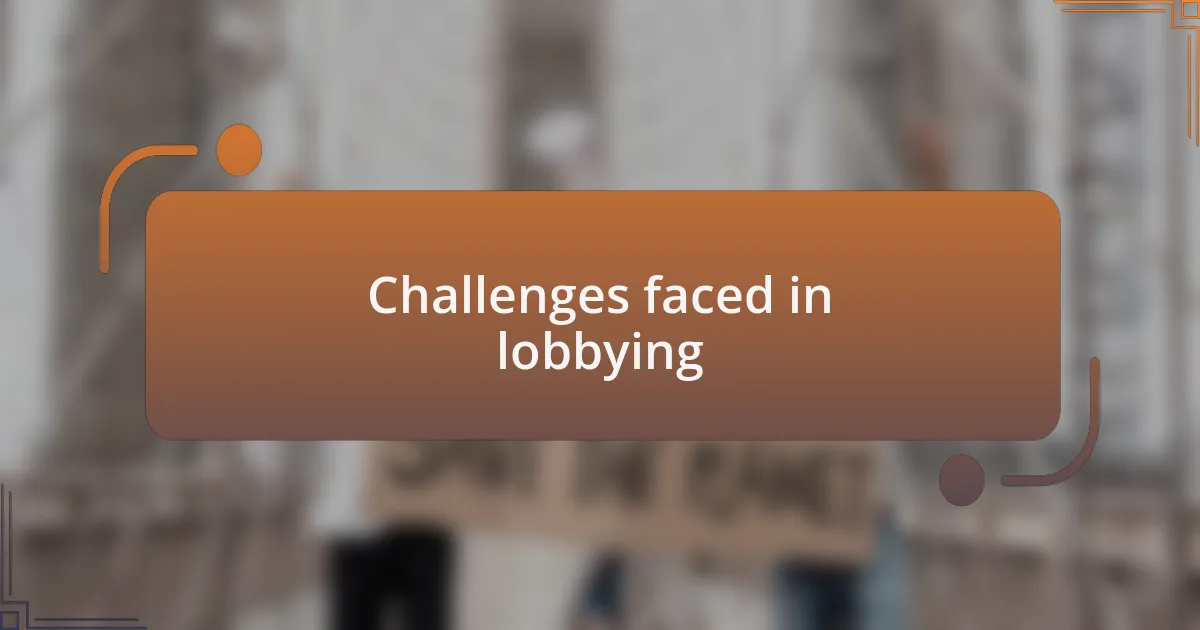
Challenges faced in lobbying
In my lobbying experiences, one significant challenge is the overwhelming opposition from well-funded groups. I’ve stood in committee rooms where the stark contrast in resources was evident. It is disheartening when well-prepared teams work tirelessly against our efforts, leaving us feeling outmatched. How do we contend with that kind of imbalance?
Another hurdle is keeping the message clear and consistent amidst the noise. I’ve noticed how easily a passionate speech can get lost among the political rhetoric, especially on social media. One time, after sharing my views online, I encountered a barrage of comments that twisted my words. It made me realize the importance of framing our arguments carefully and staying focused on our core message. Are we doing enough to ensure our voices aren’t misrepresented?
Moreover, there are days when the exhaustion of continuous advocacy weighs heavy on me. I recall a particular week of back-to-back meetings and rallies, leaving me drained and questioning the impact of my efforts. Yet, in those moments of doubt, it’s vital to remember the progress we’ve made as a community. Isn’t it those very struggles that forge resilience? Each challenge faced in lobbying shapes our resolve and fuels our passion to continue the fight.
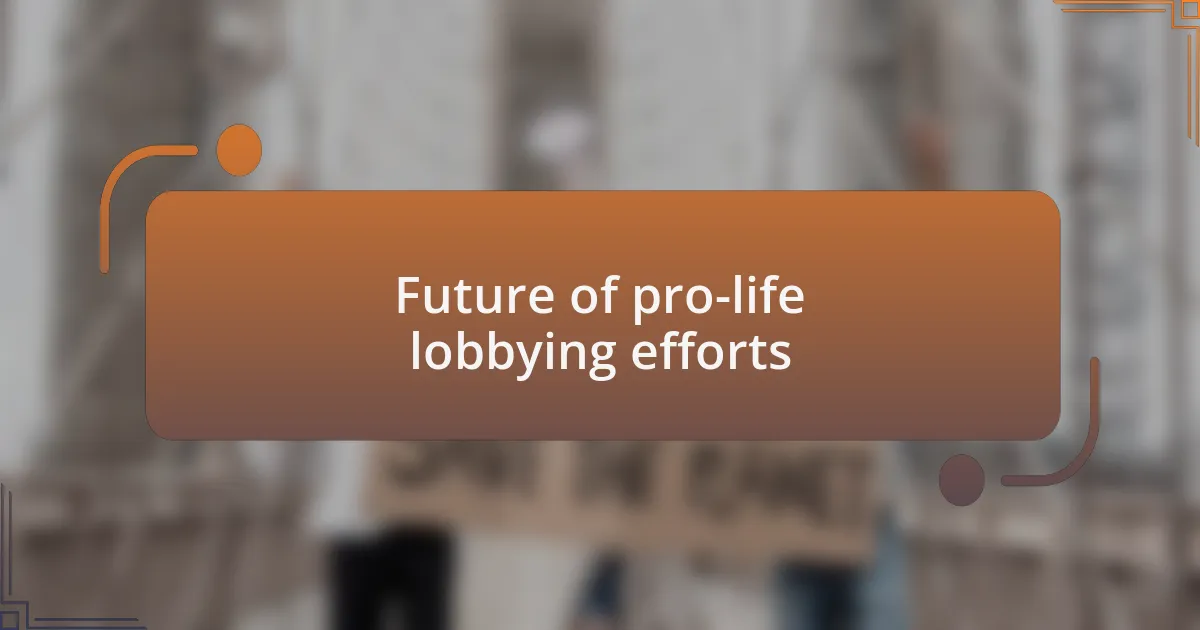
Future of pro-life lobbying efforts
The future of pro-life lobbying efforts is increasingly intertwined with technology and grassroots movements. I’ve often observed that virtual platforms have become vital for mobilizing supporters and sharing our message. Recently, during an online webinar I hosted, I felt the surge of connection among attendees from diverse backgrounds, all united for a common cause. How can these interactions be harnessed to create more powerful advocacy strategies?
As I reflect on the evolution of pro-life advocacy, I see a growing emphasis on storytelling. Personal narratives resonate deeply, often leading to compelling discussions that transcend political lines. I remember sharing my own story during a local event, and seeing the impact it had on the audience—it transformed abstract concepts into relatable emotions. Isn’t that what we need more of in our efforts: authentic experiences that touch hearts and minds?
Looking ahead, collaboration with other movements could enhance our effectiveness. I’ve attended interfaith meetings where I noticed how shared values can bridge gaps between varying perspectives. It got me thinking—if we pooled our resources and strategies, how much more could we achieve? The future of pro-life lobbying could hinge on such alliances, fostering unity in a fractured landscape.